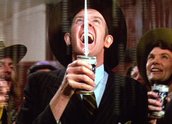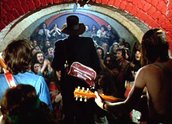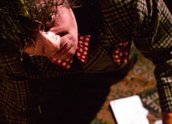


The Adventures of Barry McKenzie (1972)
Synopsis
After he comes into a small inheritance, Barry McKenzie (Barry Crocker) sets off for England with his aunt, Edna Everage (Barry Humphries), to advance his cultural education. Bazza is an innocent abroad, fond of beer, Bondi and beautiful 'sheilas’, but he soon settles into the Australian ghetto in Earl’s Court, where his old mate Curly (Paul Bertram) has a flat. He gets drunk (often), ripped off (more often), insulted by effete Englishmen (constantly) and exploited by record producers, religious charlatans and a pretentious BBC television producer (Peter Cook). He leaves England in disgust, after exposing himself on national television.
Curator’s notes
The Adventures of Barry McKenzie was a hugely popular satire with both Australian and British audiences in the early 1970s, partly because it conformed so well with each country’s popular view of the other. To the British, Bazza was confirmation of the boorish colonial Australian who was increasingly frequenting their shores, thanks to the rise of cheap airfares. He was loud, aggressive, unsophisticated, often drunk and crude, barely educated and unintelligible.
These were the aspects that Australian audiences loved, because they proclaimed his independence. Bazza may have been all those things, but he was genuine, forthright, honest in his friendship and candid in response to English deviousness. Anyone who came 'the raw prawn’ got a swift poke in the eye with the blunt stick of his indignation.
The film was based on a comic strip written by Barry Humphries for the English satirical magazine Private Eye, from an original idea by comedian Peter Cook (who plays the BBC producer in the film).
Humphries had met the young Australian Bruce Beresford in London. Beresford had spent five years at the British Film Institute and was keen to make his feature debut. He co-wrote the script with Humphries, but it is very much a first film – full of energy, but ragged in construction and uneven in execution. Bazza’s stridently colloquial expressions are entertaining but self-conscious and occasionally close to offensive.
The film was largely derided by Australian and international critics, but loved by audiences, partly because of Barry Crocker’s winning performance. The $250,000 budget was recouped in the first few months of release.
- Overview
- Curator’s notes
- Video 3 clips

- Principal credits
- Find a copy
- Make a comment
- Add your review



